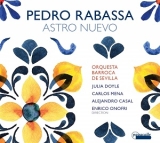 Pedro Rabassa: Kantate Astra Nuevo + Aleph. Ego vir videns (Lamentacion 3a de Viernes Santo a solo con violines + Corred, corred, pastores (Villancico al Nacimiento de Cristo para tiple solo con violines + Sonata para clave; Juan Pascual Vadivia: Area a Solo con violines para tiple Si recatada, si traslucida; Juan Manuel Gonzales: Gaitan: Cantada a solo a la Purisma Conception para soprano, violines, trombas y acompanamiento Eternamente triste; Julia Doyle, Sopran, Carlos Mena, Countertenor, Alejandro Casal, Orquesta Barroca de Sevilla, Enrico Onofri; 1 CD Passacaille 1071; Aufnahme 2019, Veröffentlichung 07/2020 (D) 08/2020 (F, UK) - (67'08) - Rezension von Remy Franck
Pedro Rabassa: Kantate Astra Nuevo + Aleph. Ego vir videns (Lamentacion 3a de Viernes Santo a solo con violines + Corred, corred, pastores (Villancico al Nacimiento de Cristo para tiple solo con violines + Sonata para clave; Juan Pascual Vadivia: Area a Solo con violines para tiple Si recatada, si traslucida; Juan Manuel Gonzales: Gaitan: Cantada a solo a la Purisma Conception para soprano, violines, trombas y acompanamiento Eternamente triste; Julia Doyle, Sopran, Carlos Mena, Countertenor, Alejandro Casal, Orquesta Barroca de Sevilla, Enrico Onofri; 1 CD Passacaille 1071; Aufnahme 2019, Veröffentlichung 07/2020 (D) 08/2020 (F, UK) - (67'08) - Rezension von Remy Franck

Kaum bekannt, wenig aufgenommen: der 1683 in Barcelona geborene und nach langer Tätigkeit als Kapellmeister an der Kathedrale in Sevilla 1867 ebenda verstorbene Pedro Rabassa wird uns mit einer Reihe von Vokalwerken und einer Sonata para clave vorgestellt. Seine Musik ist genauso attraktiv wie die der anderen Komponisten dieses Programms, das von Enrico Onofri mit viel Feingefühl dirigiert wird.
Lebendigkeit, aber keine übertriebene Dynamik kennzeichnen die Interpretationen, die auch wegen des prächtigen Musizierens des Barockorchesters aus Sevilla gefallen. Hinreißend ist auch der Gesang der Sopranistin Julia Doyle. Die Natürlichkeit der Stimmführung und die Wärme des Gesangs machen ihren Vortrag ganz besonders charmant und reizvoll. Das gelingt dem Countertenor Carlos Mena nicht ganz so gut, weil man bei ihm mehr das Bemühen um Technik spürt, das die Freiheit des Singens beeinträchtigt. Der Cembalist Alejandro Casal spielt die Sonata para clave ausdrucksvoll und gibt damit der Produktion eine weitere Farbe.
Hardly known, little recorded: Pedro Rabassa was born in Barcelona in 1683 and, after a long career as Kapellmeister at the cathedral in Seville, died there in 1867. As a series of vocal works and a Sonata para clave show, his music is as attractive as that of the other composers in this programme, which is conducted with great sensitivity by Enrico Onofri.
Liveliness but no exaggerated dynamics characterise the interpretations, which are also pleasing because of the magnificent playing of the Seville Baroque Orchestra. The performance of the soprano Julia Doyle is also enchanting. The naturalness of the voice and the warmth of the singing make it particularly charming and delightful. The countertenor Carlos Mena does not succeed in this quite so well, because with him one feels more the effort of technique, which impairs the freedom of singing. Harpsichordist Alejandro Casal plays the Sonata para clave expressively, adding another colour to the production.






















